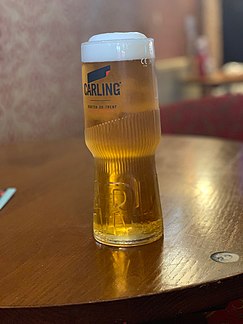Nice Carling Black Label Mirror
50cm x 42cm Sneem Co Kerry
Even though Carling originated in Canada,it’s popularity spread widely throughout the Commonwealth including Ireland .A famous advertising campaign “I bet he drinks Carling” contributed hugely to the brands market share .
Carling Black Label is a
Canadian brand of
lagerdistributed by
Carling Brewing Company. In several countries, it is also known as Carling Black Label, and in Sweden, it is known as Carling Premier. In the
United Kingdom it is now known as just Carling.
History
Although its original focus was on
ale, Carling has been brewing lager-style beers since the 1870s. In 1927, as part of an overall corporate re-branding effort under new president J. Innes Carling, the company renamed its already popular Black & White Lager to Black Label.
Three years later, Carling was purchased by
Toronto business tycoon
E. P. Taylor, who merged the company into his
Canadian Breweries Limited (CBL), which grew to be the world's largest brewing company, at least for a time. Under Taylor, Black Label was promoted as CBL's
flagship brand and went on to become the world's first beer to be brewed on a mass international scale,
becoming particularly popular in Commonwealth countries such as the United Kingdom, Australia, New Zealand and South Africa.
Canada
In response to a shift in popular taste away from ale, Carling added a three-storey lager plant to their main
London, Ontario, brewery in 1877.
Carling's Lager (later renamed Carling's Bavarian Stock Lager, and then Carling's Imperial Club Lager) was the company's first lager brand. Carling's Black & White Lager was introduced in the 1920s and later renamed Black Label Lager, in contrast to their recently launched Red Cap Ale.
Due to its strength and price, the brand quickly became popular with the country's working class, perhaps most famously among the
loggers and
miners of
Northern Ontario, where the brand gained a tough,
blue-collar image.
Around 1990, Black Label had an advertising campaign in Canada, which used the phrase "The Legend is Black."
United States

Brewing Corporation of America of Cleveland, Ohio in 1965. Home of Carling Black Label lager and Carling Red Cap Ale and former site the Peerless Motor Car Company
After the repeal of
prohibition in 1933, the
Peerless Motor Car Company, looking for a way to diversify in the poor car market of the
depression, purchased the American rights to Carling's formulas, identifying labels, and
trademarks. Technicians and
brewmasters were sent from Canada to convert a Peerless plant in
Cleveland,
Ohio, into the Brewing Corporation of America. They first tried just brewing Carling's Red Cap Ale, but sales were too slow to maintain the brewery, and sales didn't climb until the introduction of Black Label lager. The philosophy behind Black Label was to have a high quality lager that was available nationwide but with a locally brewed budget price. The strategy worked, and the next several decades led to rapid growth and expansion for the brewery and the Carling Black Label brand.
When Carling stopped producing Black Label to focus on a more profitable lager, they found their sales plummeting. Carling re-introduced Black Label with a beautiful blonde named Mabel, portrayed by Jeanne Goodspeed, with the slogan "Hey Mabel, Black Label!". The twenty-year marketing campaign cemented the name in the popular culture of America.
In 1979, after several years of intense pressure from the larger American Brewers
Miller and
Anheuser-Busch, Carling-National was bought out by the
Heileman Brewing Co. of
La Crosse, Wisconsin. Carling and the Black Label brand are currently owned by the
Molson Coors Brewing Company. Though no longer widely distributed in the U.S., Black Label remains the official beer of Beer Frisbee.
United Kingdom
Black Label was introduced to the United Kingdom in 1952. Originally, it was only available in bottles, but in 1965, The Hill Top in
Sheffield became the first pub to pour Carling Black Label draughts.
In the 1970s and 80s, Carling Black Label sales were driven to great heights, due partly to increased advertising support, in particular the classic "I bet he drinks" series of advertisements, and partly with the launch of Carling Black Label in cans. Cans were important to Carling's success as they helped open up the "take home" market.
[3]
The "I bet he drinks" series of ads showed someone doing something cool, clever or difficult, and having a bystander say "I bet he drinks Carling Black Label". With the help of this advertising campaign, it became Britain's best-selling brand of beer in 1971. In the 1980s, many of the adverts featured comedians
Mark Arden and
Stephen Frost, also known as
The Oblivion Boys, delivering the classic punchline. One of the advertisements in the series,
Dambusters from 1989, was a parody of the
1955 film of the same name, and was ranked at number 12 on
ITV's list of the "Best Ever Ads" in 2005,
and at number 17 on
Channel 4's list of the "
100 Greatest TV Ads" in 2000.
Campaign Live also ranked it at number 5 in their list of the "Top 10 Funniest TV Ads of All Time" in 2008.
Carling has remained Britain's best selling beer since 1985. 'Black Label' has been dropped from the brand name and logo in Britain since 1997.
South Africa
In South Africa, Black Label began to take on a different tone with the anti-
apartheid movement. This was partly due to the fact that, at 5.5%, it had more
alcohol than the other brands of beer that generally had 5.0%, as noted in the popular advertising catch phrase "only hard working students deserve an extra 0.5 percent."
Furthermore, the connotation of black to the racial issue became a point of pride to the native Africans. It used to be sold with the motto, "America's Lusty, Lively Beer", perhaps in reference to Canada, though it is seldom seen in the United States. The motto came from an older advertising campaign in the United States. Another famous
Afrikaans slogan for Black Label in South Africa is, "
Black Label sê die bybel", which means "The Bible says (one should drink) Black Label."
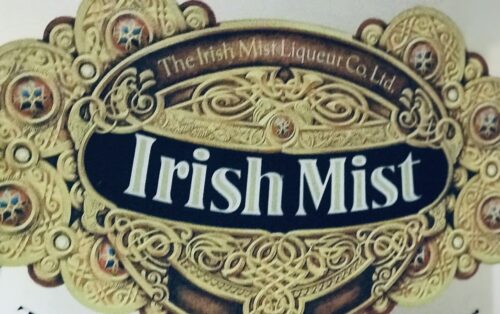
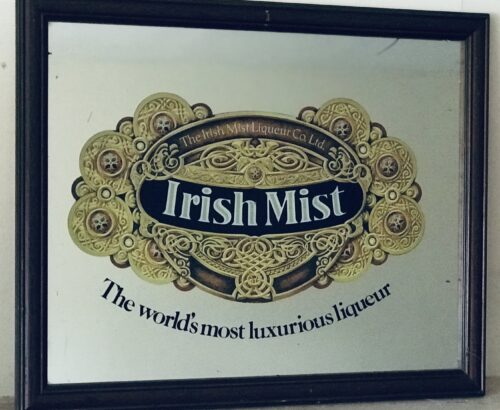 Lovely Irish Mist Pub Mirror-the Worlds Most Luxurious Liqueur Pub Mirror . Edenderry Co Offaly. 60cm x 50cm Irish Mist is a brown Whiskey Liqueur produced in Dublin, Ireland, by the Irish Mist Liqueur Company Ltd. In September 2010 it was announced that the brand was being bought by Gruppo Campari from William Grant, only a few months after Grants had bought it from the C&C Group. It is made from aged Irish whiskey, heather and clover honey, aromatic herbs, and other spirits, blended to an ancient recipe claimed to be 1,000 years old.Though it was once 80 US proof (40% alcohol per volume), Irish Mist is now 35% or 70 US proof. The bottle shape has also been changed from a “decanter” style to a more traditional whiskey bottle shape. It is currently available in more than 40 countries. Irish Mist was the first liqueur to be produced in Ireland when commercial production began in 1947 at Tullamore, County Offaly. Tullamore is the hometown of the Williams family who were the original owners of Irish Mist. The company history goes back to 1829 when the Tullamore Distillery was founded to produce Irish whiskey. In the mid-1940s Desmond E. Williams began the search for an alternative yet related product, eventually deciding to produce a liqueur based on the ancient beverage known as heather wine.In 1985 the Cantrell & Cochrane Group purchased the Irish Mist Liqueur Company from the Williams family. In the summer of 2010 Irish Mist and the entire spirit division of C&C was bought by William Grant of Scotland. In September 2010 they in turn sold Irish Mist to Gruppo Campari.Irish Mist is typically served straight up or on ice, but also goes with coffee, vodka, or cranberry juice. Per the makers, Irish Mist’s most popular recipe is Irish Mist with Cola and Lime. A Rusty Mist is an ounce of Irish Mist with an ounce of Drambuie Scotch whisky liqueur.A Black Nail is made from equal parts Irish Mist and Irish whiskey.
Lovely Irish Mist Pub Mirror-the Worlds Most Luxurious Liqueur Pub Mirror . Edenderry Co Offaly. 60cm x 50cm Irish Mist is a brown Whiskey Liqueur produced in Dublin, Ireland, by the Irish Mist Liqueur Company Ltd. In September 2010 it was announced that the brand was being bought by Gruppo Campari from William Grant, only a few months after Grants had bought it from the C&C Group. It is made from aged Irish whiskey, heather and clover honey, aromatic herbs, and other spirits, blended to an ancient recipe claimed to be 1,000 years old.Though it was once 80 US proof (40% alcohol per volume), Irish Mist is now 35% or 70 US proof. The bottle shape has also been changed from a “decanter” style to a more traditional whiskey bottle shape. It is currently available in more than 40 countries. Irish Mist was the first liqueur to be produced in Ireland when commercial production began in 1947 at Tullamore, County Offaly. Tullamore is the hometown of the Williams family who were the original owners of Irish Mist. The company history goes back to 1829 when the Tullamore Distillery was founded to produce Irish whiskey. In the mid-1940s Desmond E. Williams began the search for an alternative yet related product, eventually deciding to produce a liqueur based on the ancient beverage known as heather wine.In 1985 the Cantrell & Cochrane Group purchased the Irish Mist Liqueur Company from the Williams family. In the summer of 2010 Irish Mist and the entire spirit division of C&C was bought by William Grant of Scotland. In September 2010 they in turn sold Irish Mist to Gruppo Campari.Irish Mist is typically served straight up or on ice, but also goes with coffee, vodka, or cranberry juice. Per the makers, Irish Mist’s most popular recipe is Irish Mist with Cola and Lime. A Rusty Mist is an ounce of Irish Mist with an ounce of Drambuie Scotch whisky liqueur.A Black Nail is made from equal parts Irish Mist and Irish whiskey.
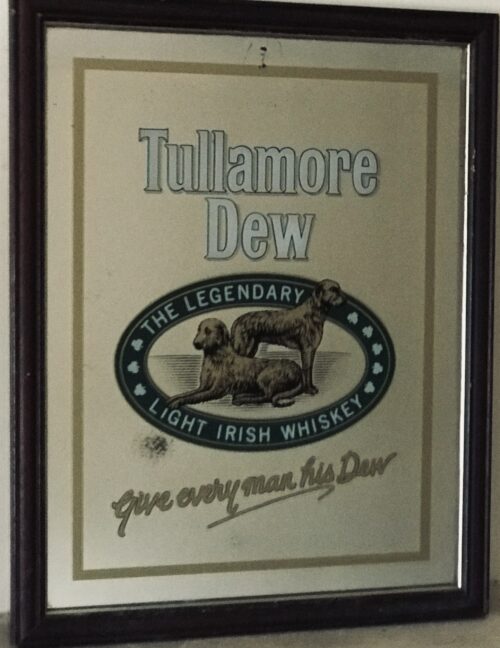 A very attractive mirror depicting the famous Tullamore Dew Irish Wolfhounds and the slogan “Give every man his Dew”. 55cm x 40cm. Tullamore Co Offaly Tullamore D.E.W. is a brand of Irish whiskey produced by William Grant & Sons. It is the second largest selling brand of Irish whiskey globally, with sales of over 950,000 cases per annum as of 2015.The whiskey was originally produced in the Tullamore, County Offaly, Ireland, at the old Tullamore Distillery which was established in 1829. Its name is derived from the initials of Daniel E. Williams (D.E.W.), a general manager and later owner of the original distillery. In 1954, the original distillery closed down, and with stocks of whiskey running low, the brand was sold to John Powers & Son, another Irish distiller in the 1960s, with production transferred to the Midleton Distillery, County Cork in the 1970s following a merger of three major Irish distillers.In 2010, the brand was purchased by William Grant & Sons, who constructed a new distillery on the outskirts of Tullamore. The new distillery opened in 2014, bringing production of the whiskey back to the town after a break of sixty years.
A very attractive mirror depicting the famous Tullamore Dew Irish Wolfhounds and the slogan “Give every man his Dew”. 55cm x 40cm. Tullamore Co Offaly Tullamore D.E.W. is a brand of Irish whiskey produced by William Grant & Sons. It is the second largest selling brand of Irish whiskey globally, with sales of over 950,000 cases per annum as of 2015.The whiskey was originally produced in the Tullamore, County Offaly, Ireland, at the old Tullamore Distillery which was established in 1829. Its name is derived from the initials of Daniel E. Williams (D.E.W.), a general manager and later owner of the original distillery. In 1954, the original distillery closed down, and with stocks of whiskey running low, the brand was sold to John Powers & Son, another Irish distiller in the 1960s, with production transferred to the Midleton Distillery, County Cork in the 1970s following a merger of three major Irish distillers.In 2010, the brand was purchased by William Grant & Sons, who constructed a new distillery on the outskirts of Tullamore. The new distillery opened in 2014, bringing production of the whiskey back to the town after a break of sixty years.
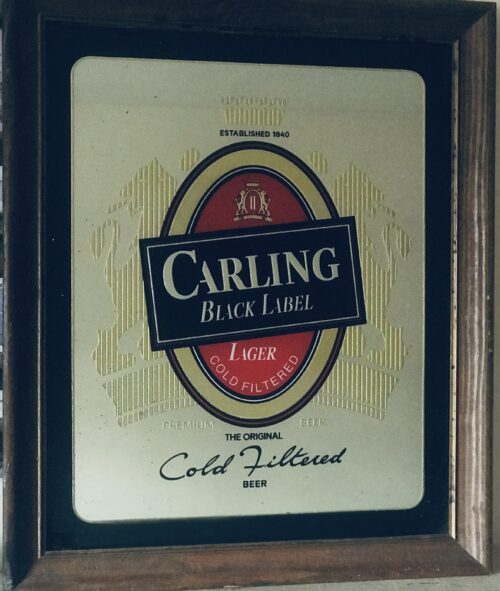 Nice Carling Black Label Mirror 50cm x 42cm Sneem Co Kerry Even though Carling originated in Canada,it’s popularity spread widely throughout the Commonwealth including Ireland .A famous advertising campaign “I bet he drinks Carling” contributed hugely to the brands market share . Carling Black Label is a Canadian brand of lagerdistributed by Carling Brewing Company. In several countries, it is also known as Carling Black Label, and in Sweden, it is known as Carling Premier. In the United Kingdom it is now known as just Carling.
Nice Carling Black Label Mirror 50cm x 42cm Sneem Co Kerry Even though Carling originated in Canada,it’s popularity spread widely throughout the Commonwealth including Ireland .A famous advertising campaign “I bet he drinks Carling” contributed hugely to the brands market share . Carling Black Label is a Canadian brand of lagerdistributed by Carling Brewing Company. In several countries, it is also known as Carling Black Label, and in Sweden, it is known as Carling Premier. In the United Kingdom it is now known as just Carling. Carling Black Label sign on a club in Pontefract, West Yorkshire.
Carling Black Label sign on a club in Pontefract, West Yorkshire. SABMiller variants of Black Label
SABMiller variants of Black Label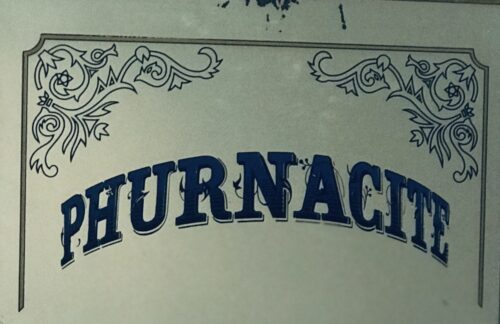
 32cm x 24cm. Limerick Nice little advertising Phurnacite mirror . For well over sixty years, Phurnacite has retained its position as the country's first choice of smokeless fuel for roomheaters, boilers and cookers. This long time favourite is manufactured from anthracite to produce a hard compact briquette with an outstanding heat output and efficiency ideal for modern solid fuel central heating systems. Phurnacite burns slowly and consistently and can be banked to slumber throughout the day and overnight.
32cm x 24cm. Limerick Nice little advertising Phurnacite mirror . For well over sixty years, Phurnacite has retained its position as the country's first choice of smokeless fuel for roomheaters, boilers and cookers. This long time favourite is manufactured from anthracite to produce a hard compact briquette with an outstanding heat output and efficiency ideal for modern solid fuel central heating systems. Phurnacite burns slowly and consistently and can be banked to slumber throughout the day and overnight.

